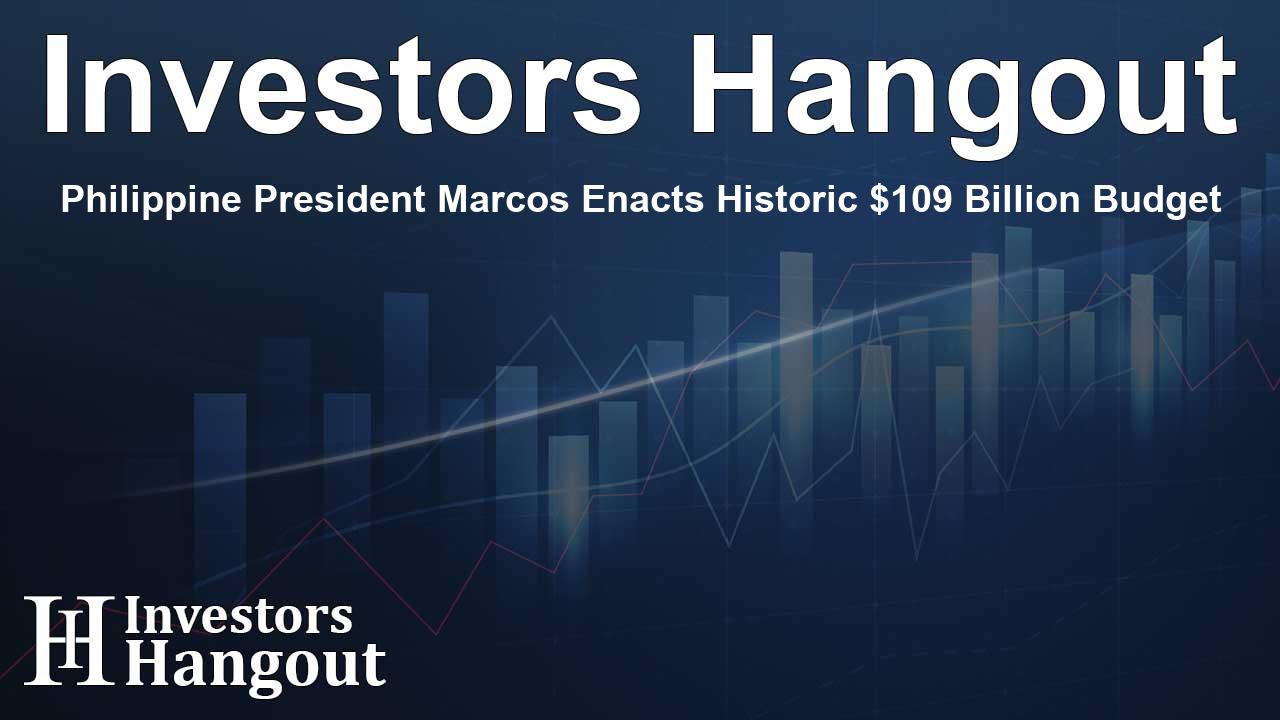Philippine President Marcos Enacts Historic $109 Billion Budget

Innovative Budget Plan for 2025 by Philippine Leadership
PHILIPPINES - President Ferdinand Marcos Jr. has taken a significant step to enhance the nation’s fiscal landscape by signing into law an impressive budget of 6.33 trillion pesos, equivalent to approximately $109.2 billion for the year 2025. This budget marks a remarkable 10% increase in government spending, reflecting a commitment to boost economic growth and alleviate poverty levels across the country.
Key Highlights of the 2025 Budget
The newly approved budget surpasses the earlier projection of 6.18 trillion pesos and incorporates critical financial estimates aimed at maintaining fiscal responsibility. Expected revenue is set at approximately 4.64 trillion pesos, while the budget deficit is planned at 5.3% of the GDP. President Marcos emphasized that the budget is crafted not merely to address immediate needs but also to foster sustainable growth that can benefit future generations. This forward-looking approach aims to create a solid foundation for continued national progress.
Significant Allocations and Sector Focus
In the allocation of resources, the education sector is the clear priority, receiving 1.053 trillion pesos, which emphasizes the government's dedication to enhancing educational outcomes. Following closely, the public works ministry is allocated 1.034 trillion pesos, underscoring the importance of infrastructure development in stimulating economic activity. Budget Minister Amenah Pangandaman provided details during a press briefing, reinforcing the government’s commitment to investing in essential public services.
Troop Modernization and Defense Spending
The military's modernization program has been allocated 35 billion pesos, which reflects a decrease from the initially proposed 50 billion pesos. This adjustment represents a careful balance between enhancing defense capabilities and managing budgetary constraints. It signals a more strategic approach in prioritizing expenditure in light of pressing national needs.
Challenges and Public Response
Despite the expansive budget, there have been concerns voiced by various advocates regarding certain reductions, particularly in the education budget and the elimination of subsidies for government health insurance programs. These cuts have raised questions about the sustainability of essential services and the long-term implications for citizens who rely on these services. The administration is tasked with addressing these issues to uphold public trust and support.
Conclusion and Economic Projections
It is notable that government expenditure plays a crucial role in driving approximately 20% of the country’s economic growth. The Philippine economy is targeting a growth rate of 6.0% to 8.0% for the year 2025, making this budget not only historic but pivotal for the nation’s economic aspirations. The signing of this budget indicates a comprehensive plan that combines growth initiatives with sector-specific investments, all while navigating the intricate economic landscape.
Frequently Asked Questions
What is the total budget approved for the Philippines in 2025?
The approved budget for 2025 is 6.33 trillion pesos, which is approximately $109.2 billion.
Which sector receives the highest allocation in the 2025 budget?
The education sector receives the largest allocation, amounting to 1.053 trillion pesos.
How does this budget compare to previous years?
This budget reflects a historic increase of 10% in government spending compared to prior projections.
What are the economic growth targets for the Philippines in 2025?
The Philippines aims for an economic growth rate of 6.0% to 8.0% in 2025.
What adjustments were made in military spending?
The military's modernization program was allocated 35 billion pesos, lower than the originally proposed 50 billion pesos.
About Investors Hangout
Investors Hangout is a leading online stock forum for financial discussion and learning, offering a wide range of free tools and resources. It draws in traders of all levels, who exchange market knowledge, investigate trading tactics, and keep an eye on industry developments in real time. Featuring financial articles, stock message boards, quotes, charts, company profiles, and live news updates. Through cooperative learning and a wealth of informational resources, it helps users from novices creating their first portfolios to experts honing their techniques. Join Investors Hangout today: https://investorshangout.com/
Disclaimer: The content of this article is solely for general informational purposes only; it does not represent legal, financial, or investment advice. Investors Hangout does not offer financial advice; the author is not a licensed financial advisor. Consult a qualified advisor before making any financial or investment decisions based on this article. The author's interpretation of publicly available data shapes the opinions presented here; as a result, they should not be taken as advice to purchase, sell, or hold any securities mentioned or any other investments. The author does not guarantee the accuracy, completeness, or timeliness of any material, providing it "as is." Information and market conditions may change; past performance is not indicative of future outcomes. If any of the material offered here is inaccurate, please contact us for corrections.